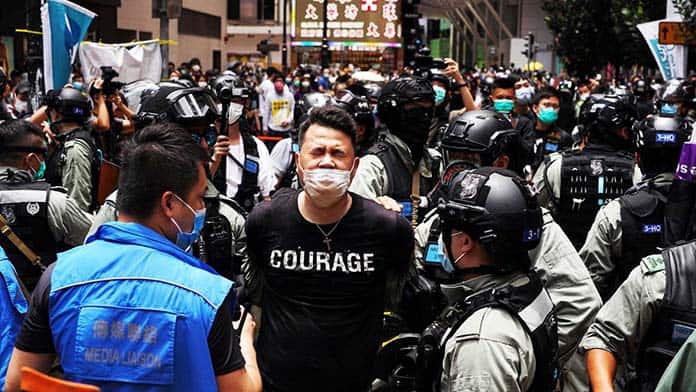With the passage of a new national security law, the Chinese government is attempting to quash Hong Kong’s protest movement. The new law came into effect on 30 June, just before the 23rd anniversary of Hong Kong’s handover from the UK to China.
Thousands have donned masks and defied protest restrictions to challenge the law on the streets. Police again attacked protesters with water cannon, tear gas and pepper spray.
By 1 July they had arrested 370 people, almost half of whom were students from schools and universities. One man has already been charged under the national security law for driving a motorcycle into a crowd of police while carrying a protest flag.
The law allows China to bypass Hong Kong’s legislature, and specifically targets anti-government protest activity with sweeping police powers. People found guilty under the law could be jailed for life.
Marches against the law have been banned, and several opposition parties have disbanded out of concerns for their members’ safety. Authorities have outlawed the popular protest slogan “Liberate Hong Kong, Revolution of Our Time”.
But even under the crackdown, a mood of defiance persists. A week after the law came into force, over 610,000 people participated in the opposition camp’s primaries, with strong results for radical and “localist” candidates ahead of September’s Legislative Council elections.
The national security law is not only a disaster for civil liberties, it will choke the ability of workers to organise even on workplace issues. China is taking advantage of the COVID-19 pandemic to ram through a law meant to intimidate the people into submission. Mass protests are needed to stop it, as they did over the extradition bill last year.
West no friend of democracy
Western leaders have posed as defenders of democratic rights in Hong Kong, with US secretary of state Mike Pompeo saying the introduction of the new law was a “sad day for freedom-loving people”.
The British government has announced that Hong Kong residents born before the handover in 1997 will be eligible to move to the UK. Australia, the UK and Canada have suspended their extradition treaties with Hong Kong.
Scott Morrison has also announced a raft of visa changes. But these are a cynical attempt to cash in on the expected exodus. Morrison has refused to allow any easier path for Hong Kong protesters to flee as refugees. Instead his changes are transparently aimed at attracting skilled workers and businesspeople.
Morrison said the changes were designed to increase economic “productivity” and explicitly included incentives for companies to relocate their regional headquarters to Australia.
Some Hong Kong activists see the West as the lesser of two evils. Some activists spent months last year touring Europe and the US to speak in favour of sanctions against China. The US has passed a version of these sanctions, but this has had no effect so far.
The West is no ally in the fight for democracy. The US supports autocratic regimes where it suits it such as Saudi Arabia and Egypt. It simply wants to use Hong Kong in its imperialist competition with China. It will help only those Hong Kongers who are of service to it, and only as long as they are politically useful.
The US, Britain and Australia lock up refugees fleeing other autocratic regimes, and have actively stoked anti-migrant racism throughout the pandemic.
Lausan Collective, a group of left-wing activists in Hong Kong, reports that all through last year’s protests, the US government continued to supply Hong Kong police with training and weapons.
It is only action by workers and ordinary people in both Hong Kong and across China that can win full democratic rights. Mobilising workers on a mass scale requires linking the fight for democracy to economic demands that address the huge inequalities that exist in Hong Kong.
And unless the movement recognises the united interests of the working poor of Hong Kong and the mainland, it will become rapidly isolated.
This requires confronting xenophobic currents within the movement. Some of these right-wing “localist” groups couch their arguments for self-determination in anti-mainland and anti-communist language, and have attacked ordinary mainland Chinese people in Hong Kong during protests.
The Chinese government has exploited this to whip up nationalist paranoia to justify its crackdown, painting all protesters as violent racists who are plotting “secession” and “collusion with foreign forces”.
The liberation of Hong Kong is bound up with the liberation of the workers of mainland China, where the very same government cracks down on factory strikes, feminist activists, and human rights campaigners. Only by linking up these struggles across borders can the movement hope to achieve its goals.
By Jason Wong




